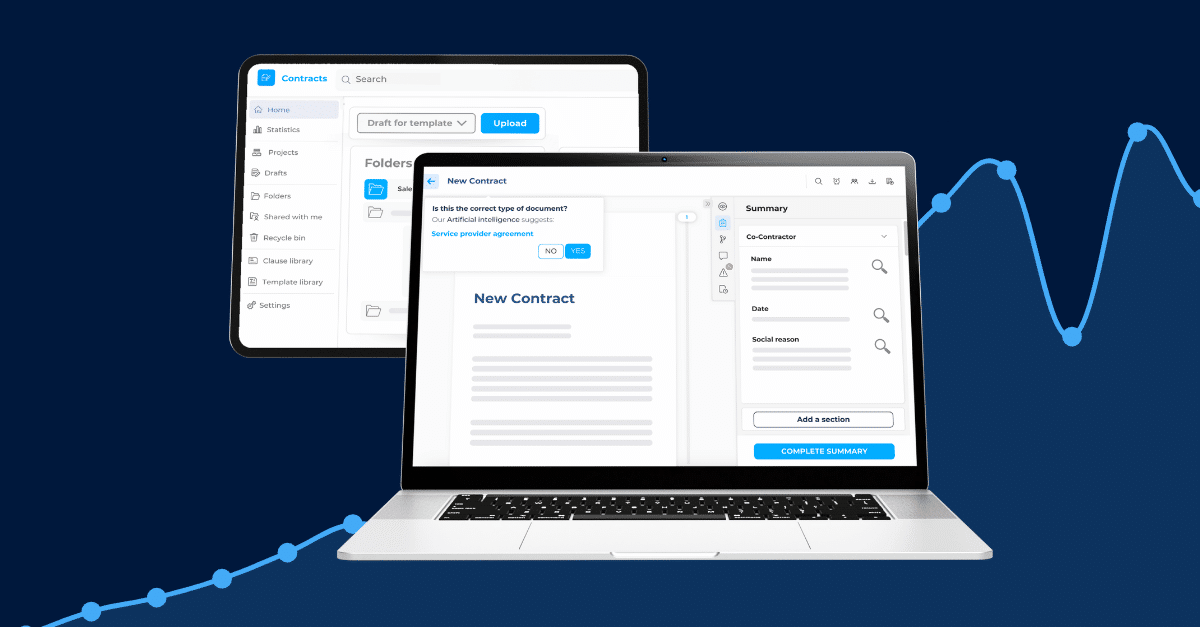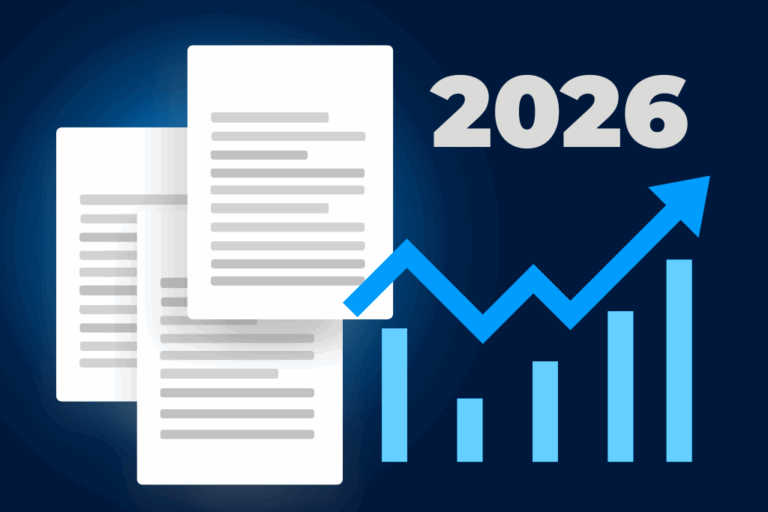A contract management system is a powerful management solution for companies, not only for the legal team. Nearly every department relies on contacts, whether in HR, procurement, finance or sales, and whether with customers, suppliers, or partners. The software enables teams to collaborate on contracts, supporting a wide range of needs, from tracking terms, deadlines, and content to enabling functions such as electronic signatures, contract creation, and verification.
A contract management system provides transparency and reduces risks, from unwanted contract extensions and unnecessary costs to the detection of critical clauses in external agreements. It also enhances collaboration and efficiency across the company. By modernizing processes and introducing automation, these contract management tools can help reduce manual work and improve performance.
Regular reports and dashboards give users full visibility into contract performance, helping teams track key dates, obligations, and service levels with ease. Automated workflows simplify review and approval steps, ensuring that every contract follows the same structured process. By integrating intelligent contract management functions and automation, companies are able to build efficient workflows, reduce missing data, and improve the overall contracting experience.
Like other modern tools, enterprise contract management systems make work not only more efficient but also more engaging, with many already incorporating generative AI and intelligent contract review functions.
What is a contract management system?
A contract management system is a digital solution for the structured handling and analysis of contracts. It allows companies to store all agreements in one place, manage contracts efficiently, and monitor every stage of the contract life cycle, from initial drafting to final archiving. The goal is to reduce risk, ensure reliable deadline tracking, and streamline collaboration across departments.
Companies can choose from different system variants: from cost-effective standard solutions to customized, comprehensive platforms. Companies can configure operation flexibly, whether as a cloud solution, an on-premises system, a hybrid model, or integrated with existing third-party applications such as ERP or CRM.
The use of a contract management system brings numerous business benefits: it makes processes more efficient, saves time and money, and significantly increases transparency in all contractual relationships.
The system also supports compliance with legal regulations and helps to identify and minimize contractual risks at an early stage. This management software can unlock potential by combining insights across all contracts into one unified view, creating contract intelligence across the organization.
The life cycle of contracts at a glance
A contract management system accompanies contracts from creation to archiving and supports each phase with digital workflows:
- Creation and drafting: Standardized templates and modular text modules enable efficient contract creation, ensuring documents are produced quickly, uniformly, and in a legally compliant way that saves time and minimizes errors. By using an intelligent contract management approach, companies can automate and streamline drafting and ensure that every contract meets compliance requirements.
- Negotiation: Once the draft contract is created, it moves into the negotiation phase if necessary. A modern contract management system supports this step by storing all versions centrally, documenting changes in audit trails and making them available to the parties involved in real time. This allows contract content to be efficiently coordinated between the parties, to collaborate on contracts, open points to be clarified and interests to be balanced.
- Approval: After the negotiation, all relevant departments are specifically involved via automated workflows in order to review and approve the draft contract. Each adjustment is automatically documented and versioned so that the entire coordination process remains transparent, audit-proof and traceable at all times for all parties involved.
- Signing: Contracts can be concluded quickly and with legal certainty, regardless of location, by integrating electronic signatures. This contracting process not only saves time, but also speeds up business processes and significantly reduces paperwork. A modern management software enables secure signatures from any location.
- Administration and control: A contract management system serves as a central platform overview in which all contract documents, deadlines and relevant data are bundled. Users can access contract content at any time, monitor key figures, performance metrics and track the degree to which agreements have been fulfilled and this way gain visibility and control over all contracts. Automated reminders ensure that no important obligations or deadlines are overlooked.
- Renewal or termination: Automatic reminders ensure timely decisions and minimize risks such as unwanted contract renewals and the resulting costs.
- Archiving: Once a contract has been concluded, it can be stored in an audit-proof manner and remains accessible at all times. Intelligent search and filter functions enable relevant documents to be called up in seconds, even in large and complex contract archives.
A contract management system thus accompanies the entire life cycle of a contract. Companies not only gain security and control, but also noticeably more time for strategic tasks.
Core functions of a contract management system
A modern contract management system combines numerous functions that make the entire contract process efficient and transparent. These include digital storage of all documents with version and access management, automated workflows for approvals and deadlines, and powerful search and filter functions for quick access to contract content.
Deadline and task management provide reliable reminders of terminations or extensions, while digital signatures enable legally compliant signatures from any location. In addition, integrated reporting and analysis functions provide valuable insights into contract terms, risks and financial obligations.
Advantages of a contract management system at a glance
Digital contract management offers numerous advantages for both small companies and large corporations:
Reasons for use: Why do companies use contract management systems?
In an increasingly complex business world, companies face the challenge of managing a growing number of contracts efficiently and in compliance with the law. A contract management system provides the ideal basis for this.
Complexity of the contract landscape: As the company grows in size, the number and complexity of contracts increases. A system creates order and structure.
Risk minimization: Missing notices, forgotten renewals or missed deadlines can be expensive. A system prevents exactly that.
Increased efficiency: Digital workflows speed up approvals and reduce the coordination effort between departments.
Which departments benefit from this?
A contract management platform supports use across all departments. Key benefits:
Legal department: By standardizing templates and defining clear approval processes, the legal department retains legal control over contract content at all times, while at the same time reducing the workload through automated processes.
Purchasing: Structured processes document contract negotiations with suppliers and make them more efficient. This makes it possible to manage framework agreements, conditions, and SLAs transparently.
Distribution: Clear processes for approvals, versioning, and digital signatures let teams create, adapt, and manage customer contracts quickly. This accelerates the sales cycle and ensures legal certainty in the closing process.
Finances: Users can view payment obligations, contract terms, and budget effects at any time. This supports precise liquidity planning and minimizes financial risks.
Sales: Contract management systems allow sales teams to swiftly create, adapt and finalise customer agreements by using standardised templates, automated approvals and digital signatures. This shortens the sales cycle, ensures compliance with internal and legal requirements, and provides complete visibility of terms, conditions, and renewals.
HR: Companies can centrally manage, version, and archive employment contracts and supplementary agreements in a revision-proof manner. This maintains an overview of employment relationships, deadlines and contract amendments.
Thanks to standardized templates within contract management software, specialist departments no longer need to go through the legal department to create or review contracts. This saves a great deal of time, and contract processes run much more efficiently.
Cloud-based contract management: Secure and Flexible
More and more companies are opting for cloud-based contract management systems as they offer a high degree of flexibility, scalability and security. Especially in times of hybrid working models and decentralized teams, cloud-based solutions are a viable choice for the future.
Overall, cloud-based contract management offers a future-proof, user-friendly and secure solution, ideal for companies of all sizes that value efficiency and mobility.
AI-powered contract management solutions
AI-powered contract management technology goes beyond simple digitalization by applying machine learning and natural language processing to accelerate legal work. Automated clause detection and contract review highlight risks, inconsistencies, or missing provisions in seconds, reducing manual effort and human error. Predictive analytics forecast renewal risks, financial exposure, and negotiation outcomes, while intelligent search makes critical information instantly accessible across large contract portfolios. With these AI-driven capabilities, legal teams gain deeper insights, make faster decisions, and ensure stronger compliance than with traditional systems.
Selection criteria: How to find the right system
Choosing the right contract management system is crucial for the long-term success of your digital contract management. You should consider various criteria to ensure that the solution is not only technically convincing, but also fits your individual requirements.
1. Define requirements
Start with a clear analysis: Which functions do you really need? For example, should the system support e-signatures, automatically monitor deadlines and data or enable granular assignment of rights? Solutions such as Contract Lifecycle Management (CLM) from DiliTrust offer a high degree of customizability and cover all use cases, from automated contract creation to audit-proof archiving.
2. AI-supported contract review
A modern contract management system should offer more than digital filing. Solutions with integrated artificial intelligence that can automatically analyze contracts, identify risks or detect missing clauses are especially powerful. This capability saves time, reduces errors and increases legal certainty.
3. User-friendliness
An intuitive interface is crucial for company-wide adoption. The DiliTrust software stands out with its user-friendly design, tailored to different types of users. The system structures all functions logically so users can operate them without extensive training.
4. Integration into existing systems
Check whether the contract management system integrates seamlessly into your existing IT landscape, such as ERP, CRM, or collaboration platforms like Microsoft 365. DiliTrust CLM enables smooth integration and thus facilitates the cross-departmental exchange of information.
5. Security and data protection
Protection against unauthorized access is essential, especially for sensitive contract data. DiliTrust uses state-of-the-art encryption methods, native SSO integration (single sign-on) and a proprietary AI to ensure the highest security standards and GDPR compliance. The system stores your contract documents centrally and provides secure access at any time.
5. Training, support, and continuous improvement
A reliable provider not only offers a strong product, but also continuous support, regular updates, and training for your employees when needed. DiliTrust provides dedicated customer service in multiple languages and ensures that your system always stays up to date.
With a powerful solution like DiliTrust CLM, you not only simplify your contract management, but also automate complex processes and reduce manual effort. The result: more efficiency, better control and maximum security, tailored to your company’s needs.
Conclusion: Why contract management is indispensable today
There is a clear answer to the question of why digital contract management is indispensable today: because companies use it to ensure legal certainty, reduce costs, automate processes and ultimately save time and resources. A contract management system has long been more than just a digital archive.
A modern system supports the entire contract management process by offering the possibility of organizing contracts and documents centrally, automating functions such as monitoring deadlines, and significantly simplifying the search for relevant information. In addition, employees can independently contribute to the creation of contracts within the framework of clear guidelines, which makes everyday life noticeably easier and relieves the legal department.
Especially in times of working from home, hybrid working and increasing contract complexity, support from a modern solution is essential.
Large companies benefit just as much as smaller firms, as modern solutions adapt to specific requirements. Large companies benefit just as much as smaller firms, as modern solutions adapt to specific requirements.
Using a modern system for best contract management allows companies to manage processes easily, minimize risks, and improve collaboration long-term. The quadrant for contract solutions shows that AI-powered, cloud-based, and enterprise systems represent the best contract approach today. Companies that implement such systems can now transform contract management into a strategic, streamlined, and intelligent function.



